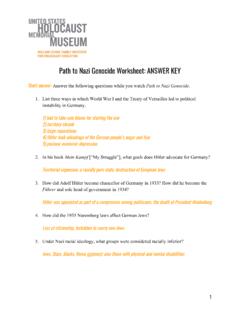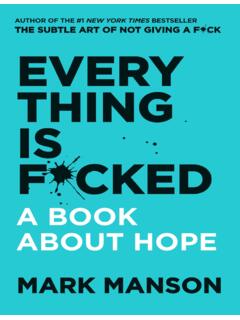Transcription of Interpretations of the Holocaust
1 Interpretations of the Holocaust From the mid-1960s, Interpretations of nazi Germany for the most part have been divided between two schools, which are characterised as the intentionalists' and the functionalists'. Intentionalists focus on Hitler and his ideology . In their view, the course of the Third Reich was primarily determined by the decisions of Adolf Hitler, which were intended' to realise the goals of an ideologically derived programme to which he had clung with fanatical consistency since the 1920s.
2 Functionalists focus on the structures and institutions of the Third Reich, explaining the Holocaust as an unplanned cumulative radicalisation' produced by the chaotic decision-making process of a polycratic regime and ideological motivation to rid Germany of destructive elements.[1] This debate has continued to polarise Holocaust historians and it is only recently that some sort of compromise has been reached. [1] C. Browning, The Path to Genocide: Essays on Launching the Final Solution, Cambridge, Cambridge & New York, 1992, p.
3 86. Intentionalist Interpretations - espoused by such historians as Karl Bracher, Alan Bullock, Daniel Goldhagen, Klaus Hildebrand, Andreas Hillgruber and Eberhard J ckel - identify a straight line from Hitler's Mein Kampf to the Holocaust . The intentionalists concentrate on political and diplomatic history and have focused their interpretation of the nazi period on the central role of Hitler and the continuity of his ideological goals from their crystallisation in the 1920s through to their realisation in the early 1940s.
4 They quote classic texts, such as Hitler's speech of 30 January 1939, which predicted the extermination of the Jews. Although there is disagreement about when an order' was given for the Jews' extermination in Europe, intentionalists do not question Hitler's knowledge and leading role. They would say that Hitler decided on the mass murder of the Jews in the 1920s and thereafter worked with consciousness and calculation toward that goal. In some cases, the plan for the Holocaust is tracked back to 1919.
5 Insofar as nazi Jewish policy in the 1930s could be seen as conscious preparation for mass murder, it is embraced by intentionalists as evidence of continuity; when it did not, it is dismissed as either temporary expediency or the irrelevant and unguided experiments of Hitler's subordinates. Many intentionalists have used Hitler's speech to the Reichstag in January 1939, only months before the war's outbreak, as proof of his intention to carry out the Final Solution. Hitler declared: "Today I will once more be a prophet: If the international Jewish financiers in and outside of Europe should succeed in plunging the nations once more into a world war, then the result will not be the Bolshevisation of the earth, and thus the victory of Jewry, but the annihilation of the Jewish race in Europe!
6 " Hitler often referred to this prophecy' at critical junctions in the war and the perpetrators of the genocide quoted the speech to justify their actions. It has been argued on the basis of this speech that politically aware members of the German public should have concluded from it that the ultimate fate of the Jews would be physical annihilation.[2] [2] H. Mommsen, "Hitler's Reichstag Speech of 30 January 1939", History and Memory, Vol. 9, Issue 1, 30 September 1997, p. 147. Intentionalists believe that the ultimate decision to implement the Final Solution was tied to the invasion of Russia.
7 The conquest of lebensraum and the total destruction of European Jewry were seen as so inextricably connected in Hitler's ideology that he inevitably sought to realise the two simultaneously.[3] Together, they constituted the nucleus of Hitler's racist ideology and were his conscious goals since the 1920s. Anti-Semitism was the core element of Hitler's world view and the Final Solution emerged in 1941 from a series of decisions taken by Hitler to achieve these long-held and connected goals at the same time.
8 [4] [3] Browning, op. cit., p. 87. [4] Ibid, p. 5. Intentionalists stress the importance of ideology rather than structure and the Holocaust is located primarily within the contexts of German and Jewish history (rather than in the context of modernity or along a continuum of genocidal events in human history). Intentionalists also tend to argue for the uniqueness of the Holocaust , insisting that it was such an extreme form of genocide that it must be separated from other examples. The most controversial addition to the intentionalist interpretation was Hitler's Willing Executioners: Ordinary Germans and the Holocaust by Daniel Goldhagen, which argued that anti-Semitism was the primary cause of the Holocaust and that Hitler was the prime mover of the persecution that culminated in genocide.
9 While Goldhagen's book sparked intense debate, it does not appear to have exercised much influence on subsequent studies of the Holocaust . A common intentionalist position has all but disappeared. What they have in common is a concentration on the role of Hitler and the top leadership in the decision-making process.[5] [5] Ibid, p. 94. For Andreas Hillgruber, there was a fundamental connection in Hitler's mind between the acquisition of lebensraum through the invasion of Russia and a solution to the Jewish question through systematic mass murder.
10 Hitler's policy from 1928 until the end of the Third Reich was to use anti-Semitism to dominate Europe. According to Hillgruber, Hitler's plan was to gain power in Germany and central Europe and then to extend Germany's influence into the East. Russia's defeat became inseparable from the extermination of the Jews.[6] To Hitler, the extermination of the Russian ruling class and Eastern European Jews was the prerequisite for German rule over Europe because there was a mythical link between Bolshevists and Jews in National Socialist ideology .

